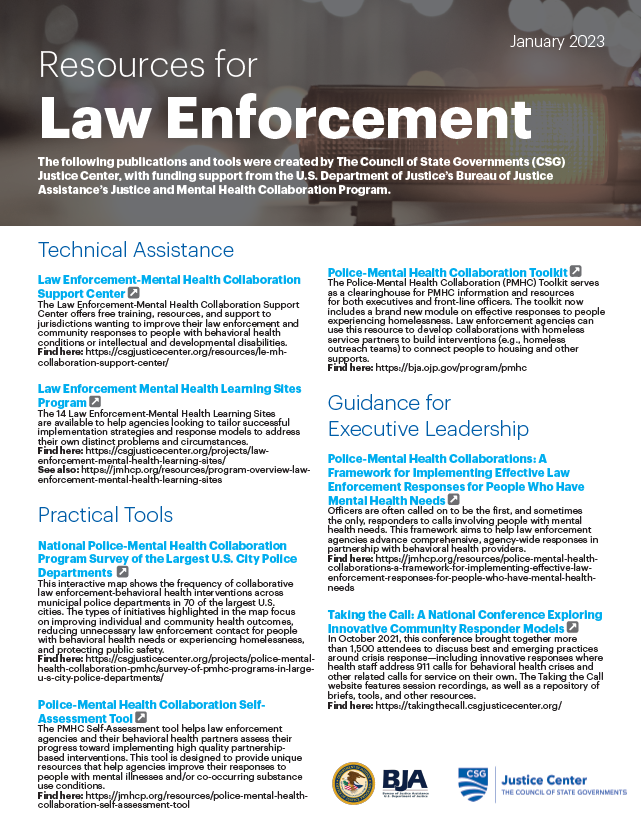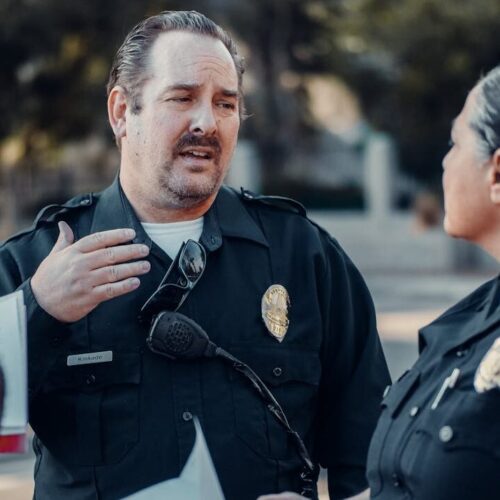Resources for Law Enforcement
This brief offers a repository of publications and technical assistance tools created by the CSG Justice Center with funding support from BJA’s Justice and Mental Health Collaboration Program. Photo credit: Canva
Resources for Law Enforcement
The following publications and tools were created by The Council of State Governments (CSG) Justice Center, with funding support from the U.S. Department of Justice’s Bureau of Justice Assistance’s Justice and Mental Health Collaboration Program.
Technical Assistance
Law Enforcement-Mental Health Collaboration Support Center
The Law Enforcement-Mental Health Collaboration Support Center offers free training, resources, and support to jurisdictions wanting to improve their law enforcement and community responses to people with behavioral health conditions or intellectual and developmental disabilities.
Find here: https://csgjusticecenter.org/resources/le-mh-collaboration-support-center/
Law Enforcement Mental Health Learning Sites Program
The 14 Law Enforcement-Mental Health Learning Sites are available to help agencies looking to tailor successful implementation strategies and response models to address their own distinct problems and circumstances.
Find here: https://csgjusticecenter.org/projects/law-enforcement-mental-health-learning-sites/
See also: https://jmhcp.org/resources/program-overview-lawenforcement-mental-health-learning-sites
Practical Tools
National Police-Mental Health Collaboration Program Survey of the largest U.S City Police Departments
This interactive map shows the frequency of collaborative law enforcement-behavioral health interventions across municipal police departments in 70 of the largest U.S. cities. The types of initiatives highlighted in the map focus on improving individual and community health outcomes, reducing unnecessary law enforcement contact for people with behavioral health needs or experiencing homelessness, and protecting public safety.
Find here: https://csgjusticecenter.org/projects/police-mentalhealth-collaboration-pmhc/survey-of-pmhc-programs-in-largeu-s-city-police-departments/
Police-Mental Health Collaboration Self- Assessment Tool
The PMHC Self-Assessment tool helps law enforcement agencies and their behavioral health partners assess their progress toward implementing high quality partnership-based interventions. This tool is designed to provide unique resources that help agencies improve their responses to calls for service for people with mental illnesses and/or co-occurring substance use conditions.
Find here: https://jmhcp.org/resources/police-mental-healthcollaboration-self-assessment-tool
Police-Mental Health Collaboration Toolkit
The Police-Mental Health Collaboration (PMHC) Toolkit serves as a clearinghouse for PMHC information and resources for both executives and front-line officers. The toolkit now includes a brand new module on effective responses to people experiencing homelessness. Law enforcement agencies can use this resource to develop collaborations with homeless service partners to build interventions (e.g., homeless outreach teams) to connect people to housing and other supports.
Find here: https://bja.ojp.gov/program/pmhc
Guidance for Executive Leadership
Police-Mental Health Collaborations: A Framework for Implementing Effective Law Enforcement Responses for People Who Have Mental Health Needs
Officers are often called on to be the first, and sometimes the only, responders to calls involving people with mental health needs. This framework aims to help law enforcement agencies advance comprehensive, agency-wide responses in partnership with behavioral health providers.
Find here: https://jmhcp.org/resources/police-mental-health-collaborations-a-framework-for-implementing-effective-law-enforcement-responses-for-people-who-have-mental-health-needs
Taking the Call: A National Conference Exploring Innovative Community Responder Models
In October 2021, this conference brought together more than 1,500 attendees to discuss best and emerging practices around crisis response—including innovative responses where health staff address 911 calls for behavioral health crises and other related calls for service on their own. The Taking the Call website features session recordings, as well as a repository of briefs, tools, and other resources.
Find here: https://takingthecall.csgjusticecenter.org/
Practical Briefs
Addressing Misconceptions about Mental Health and Violence
Despite public perception that there is a direct connection between mental health and violence, research shows that this relationship is complex, and that the presence of a mental illness doesn’t automatically predispose a person to violent behavior. As criminal justice professionals work to protect public safety, it’s important that their policies and practices reflect accurate information, not common misperceptions. This brief addresses these misconceptions, presents important information about risk factors for violence, and offers ways that criminal justice professionals can help to mitigate such risks.
Find here: https://jmhcp.org/resources/addressing-misconceptions-about-mental-health-and-violence
Building a Comprehensive and Coordinated Crisis System
Across the nation, communities are grappling with how to respond to crisis calls, particularly ones involving people with behavioral health needs. As they work to build and expand their crisis systems, communities are also looking to expand beyond typical police responses to include mental health professionals and other community responders. This brief highlights the continuum of responses that make up a comprehensive, coordinated crisis system and offers guidance for building a system that addresses local needs.
Find here: https://jmhcp.org/resources/building-a-comprehensive-and-coordinated-crisis-system
Community-Driven Crisis Response: A Workbook for Coordinators
This workbook contains worksheets, charts, discussion questions, and relevant resources for planning team coordinators to guide their team’s work and vision for launching a community-driven crisis response system.
Find here: https://jmhcp.org/resources/community-driven-crisis-response-a-workbook-for-coordinators
Embedding Clinicians in the Criminal Justice System
Hiring clinicians to work with criminal justice agencies throughout the different intercepts in the justice system is one way that jurisdictions are working to improve their responses to people with mental health needs. Using the Sequential Intercept Model as the starting point for identifying where clinicians can be employed, this brief highlights ways that embedded clinicians can support mental health and criminal justice collaborations. It also provides specific examples of Justice and Mental Health Collaboration Program grantees successfully implementing clinician-embedded programs throughout the criminal justice system.
Find here: https://jmhcp.org/resources/embedding-clinicians-in-the-criminal-justice-system
988: A Shared Opportunity for Criminal Justice and Behavioral Health Partners
This webpage features videos, resources, and news articles to help criminal justice leaders in their efforts to raise awareness of the services 988 provides, build a shared vision of the opportunity 988 presents, and coordinate with their 988 partners and other behavioral health crisis providers to appropriately direct people to 988 from first contact with law enforcement through reentry.
Find here: https://csgjusticecenter.org/projects/988-a-shared-opportunity/
Improving Outcomes for People in Contact with the Criminal Justice System Who Have Intellectual or Developmental Disabilities
When people with intellectual or developmental disabilities (IDD) encounter or are involved in the criminal justice system, they often experience a system that is unable to address their unique needs and face misconceptions about their abilities. However, there are ways to help improve outcomes for people with IDD and reduce their chances of re-encountering the criminal justice system. This brief offers important steps that criminal justice administrators can take to better identify and respond to the needs of people with IDD.
Find here: https://jmhcp.org/resources/improving-outcomes-for-people-in-contact-with-the-criminal-justice-system-who-have-intellectual-or-developmental-disabilities
Mental Health Training: Strategies for Small and Rural Law Enforcement Agencies
Small and rural jurisdictions, which make up the majority of police departments across the country, often face distinct challenges that make it difficult to implement the types of mental health training programs that larger and urban agencies can access. This brief details strategies for small and rural law enforcement agencies to develop and implement comprehensive, high-quality training that creatively addresses their unique challenges.
Find here: https://jmhcp.org/resources/mental-health-training-strategies-for-small-and-rural-law-enforcement-agencies
The Role of Probation and Parole in Making Housing a Priority for People with Behavioral Health Needs
Safe, affordable, and permanent housing is widely recognized as one of the most crucial components of successful reentry. But finding permanent housing is often a challenge for people leaving prison or jail, particularly people with behavioral health needs who often cycle between homeless shelters, jails, and psychiatric institutions. This brief explains how probation and parole officers can help people with behavioral health needs obtain safe and affordable housing as they reenter the community.
Find here: https://jmhcp.org/resources/the-role-of-probation-and-parole-in-making-housing-a-priority-for-people-with-behavioral-health-needs
Tips for Successfully Implementing a 911 Dispatch Diversion Program
A model showing great promise across the U.S. is 911 dispatch diversion, sometimes called crisis call diversion. The approach aims to reduce unnecessary police contact by connecting people to mental health professionals when someone contacts 911 due to a behavioral health crisis or other health or social service need. This brief outlines four tips for successfully implementing 911 dispatch diversion in a community.
Find here: https://jmhcp.org/resources/tips-for-successfully-implementing-a-911-dispatch-diversion-program
Tips for Successfully Implementing Crisis Stabilization Units
A growing number of jurisdictions are creating crisis stabilization units (CSUs) to provide officers with an option to link people to the most appropriate supportive services, help reduce arrests, and improve outcomes for people with behavioral health needs. This brief provides an overview of CSUs for criminal justice professionals and offers universal, practical tips to design and operate a successful CSU.
Find here: https://jmhcp.org/resources/tips-for-successfully-implementing-crisis-stabilization-units
Project Credits
Writing: Dr. Ayesha Delany-Brumsey, CSG Justice Center
Editing: Darby Baham, CSG Justice Center
Design: Shannon Moriarty, CSG Justice Center
Public Affairs: Ruvi Lopez, CSG Justice Center
Web Development: Eleventy Group and Catherine Allary, CSG Justice Center
This brief was supported by Grant No. 2019-MO-BX-K002, awarded by the Bureau of Justice Assistance. The Bureau of Justice Assistance is a component of the Department of Justice’s Office of Justice Pro¬grams, which also includes the Bureau of Justice Statistics, the National Institute of Justice, the Office of Juvenile Justice and Justice and Delinquency Prevention, the Office for Victims of Crime, and the Office of Sex Offender Sentencing, Monitoring, Apprehending, Registering, and Tracking (SMART). Points of view or opinions in this document are those of the author and do not necessarily represent the official position or policies of the U.S. Department of Justice.
ABOUT THE AUTHOR

The sharp rise in school shootings over the past 25 years has led school officials across the U.S.…
Read MoreA three-digit crisis line, 988, launched two years ago to supplement—not necessarily replace—911. Calling 988 simplifies access to…
Read MoreIt would hardly be controversial to expect an ambulance to arrive if someone called 911 for a physical…
Read More Taking the HEAT Out of Campus Crises: A Proactive Approach to College Safety
Taking the HEAT Out of Campus Crises: A Proactive Approach to College Safety
The sharp rise in school shootings over the past 25 years has…
Read More From 911 to 988: Salt Lake City’s Innovative Dispatch Diversion Program Gives More Crisis Options
From 911 to 988: Salt Lake City’s Innovative Dispatch Diversion Program Gives More Crisis Options
A three-digit crisis line, 988, launched two years ago to supplement—not necessarily…
Read More Matching Care to Need: 5 Facts on How to Improve Behavioral Health Crisis Response
Matching Care to Need: 5 Facts on How to Improve Behavioral Health Crisis Response
It would hardly be controversial to expect an ambulance to arrive if…
Read More












